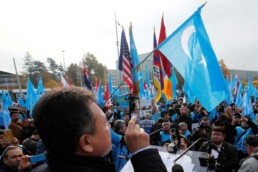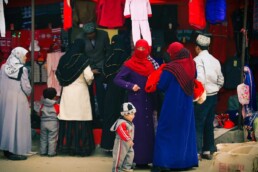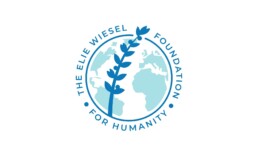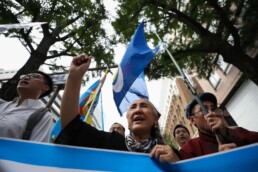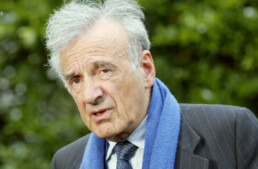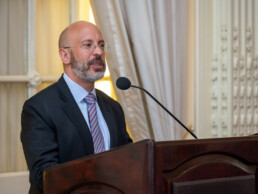Three Uyghur groups receive grants from Elie Wiesel Foundation
The grants aim to help shed light on China’s genocide of Uyghurs, foundation head says.
2023.07.11
The Elie Wiesel Foundation for Humanity has awarded grants amounting to hundreds of thousands of dollars to three Uyghur groups dedicated to Uyghur rights advocacy and education amid ongoing repression against the mostly Muslim ethnic group by Chinese authorities.
The Germany-based World Uyghur Congress and U.S.-based Uyghur Human Rights Project were selected as grantees for planning to host a conference of Uyghur allies and activists later this year in New York to discuss the international response to the persecution of Uyghurs, which the U.S. government and other Western parliaments have labeled a genocide.
They will hold the event along with Jewish World Watch, another grantee.
The third Uyghur organization selected as a grantee is Ana Care and Education, a nonprofit based in Virginia, in the United States, that provides programs for Uyghur families living in the diaspora to preserve their language, history and culture.
The grantees were selected “based on their commitment to advocating for the Uyghur community, who are being unlawfully detained by the Chinese government in an effort to create a single-ethnic state,” the nonprofit organization said in a statement issued on Monday.
Grants totaling US$550,000 were awarded to the activist organizations as well as to four other nonprofits for educational fellowships, though the specific amounts for each were not given.
The grant-making initiative, launched in October 2022, supports organizations whose efforts are grounded by the values of Elie Wiesel, a writer, educator, political activist and Holocaust survivor who died in 2016.
Wiesel and his wife, Marion, set up the foundation after he received the 1986 Nobel Prize for Peace.
Elisha Wiesel, Elie’s son and chairman of the foundation, told Radio Free Asia that by using the money to shed light on the Uyghur genocide, the world will learn about the crimes that are occurring in Xinjiang.
“The largest genocide on the planet is [that of the] Uyghur minority,” Elisha Wiesel said. “Right now, the Chinese government is trying to end their Muslim practices, trying to assimilate their faith, and as is in many ways trying to end their identity as a people, including the use of detainment camps.”
“We feel it is the cause that is the most severe on the planet, and yet not many people are speaking about it.”
Dolkun Isa, president of the World Uyghur Congress, said the grant is important because it will help make the world accept the genocide, gain the world’s sympathy, and make the Jewish community more aware of the Uyghur issue and act upon it.
Sureyya Kashgary, director of Ana Care & Education, said her organization received a $50,000 grant for school-based learning for students and adults that connect them to their Uyghur ancestry.
Translated by RFA Uyghur. Edited by Roseanne Gerin and Malcolm Foster.
LA-Based Nonprofit Jewish World Watch Benefits From $550,000 Grant
Jewish World Watch, the Los Angeles-based nonprofit committed to bringing help and healing to survivors of mass atrocities across the globe, announced Monday it received a share of a $550,000 grant for its landmark winter conference in New York.
The Elie Wiesel Foundation for Humanity awarded JWW as one of its first beneficiaries of its inaugural grant-making cycle. Launched in October 2022, the foundation identifies and supports organizations whose efforts are grounded by Elie Wiesel’s legacy as an educator, activist, journalist and a man of faith.
“We are honored to be among the first organizations to receive a grant from the Elie Wiesel Foundation,” Serena Oberstein, executive director of JWW, said in a statement.
JWW is joined by World Uyghur Congress and Uyghur Human Rights Project as grantees, selected in-part for their advocacy of and for the Uyghur community. At least 1.8 million Uyghurs have been separated from their families and forced into “re-education camps” since 2017 in northwest China or East Turkestan, according to the foundation.
“Our inaugural activist portfolio grants are laser-focused toward advocates working purposefully and urgently toward restoring the rights and dignity of the Uyghur population,” Elisha Wiesel, chairman of the foundation, said in a statement.
“For those of us working at the intersection of Judaism and activism, Elie Wisel’s legacy represents perseverance, hope and the obligation each of us has to work for a world free of genocide.”
The $550,000 grant will support the trio’s winter conference of Uyghur activists and allies in New York to address the international response of Uyghur genocide.
JWW officials said the conference is intended to build collaboration among stakeholders and energize current efforts of Uyghur activism.
“The opportunity to work alongside our valued allies at the Eli Wiesel Foundation and in collaboration with Jewish World Watch and World Uyghur Congress is of enormous value,” Omer Kanat, executive director of the Uyghur Human Rights Project, said in a statement.
“The conference in December will be a chance to demonstrate a commitment to upholding the vow of `never again’ in solidarity, and to call for further action to stop ongoing genocide.”
Elie Wiesel Foundation Announces Inaugural Grantees Dedicated to Uyghur Advocacy Efforts and Education
Grants totaling $550,000 to be awarded to Organizations supporting Elie Wiesel’s Values and Mission
This year’s Activist Portfolio Grantees were selected based on their commitment to advocating for the Uyghur community, who are being unlawfully detained by the Chinese government in an effort to create a single-ethnic state.
“Our inaugural Activist Portfolio grants are laser-focused towards advocates working purposefully and urgently towards restoring the rights and dignity of the Uyghur population”, said Elisha Wiesel, Chairman of the Foundation.
“Chinese regime de facto keeps the Uyghur people in concentration camps, treating them in the most inhuman way. It’s probably the most massive violation of human rights in our time, while the Free World’s response is disproportionately weak to the scope of this crime.” Says Natan Sharansky, renowned Human Rights Activist and member of the Foundation’s Grant Selection Committee. “That is why it is very logical and appropriate that the first grant of the Elie Wiesel Foundation is dedicated to elevating education and Uyghur advocacy efforts.”
The selected Grantees are:
- World Uyghur Congress, Uyghur Human Rights Project, and Jewish World Watch: WUC, UHRP, and JWW will host a Conference of Uyghur activists and allies to consider the international response to the Uyghur genocide. To be held this winter in New York, the Conference will aim to foster collaboration between these stakeholders, energize current efforts of Uyghur activism, and discuss new ways to activate the Jewish community and engage other citizens of conscience.
- Ana Care & Education: Ana Care aims to preserve the Uyghur language, history, and culture through interactive programming for Uyghur families in the diaspora. They provide school-based learning for students and adults that helps shape relationships, builds community, and continues to connect them to their Uyghur ancestry.
The Educator Portfolio honors Elie Wiesel’s commitment to education by supporting programs that foster dialogue connected to moral education grounded in Jewish values.
“Our inaugural Educator Portfolio grants will elevate the patient, thoughtful work being done by moral educators to bring Jewish values to life in the classroom”, said Elisha Wiesel, chairman of the Foundation.”
The selected Grantees in the Educator Portfolio are:
- The Witness Institute: The idea of the Witness Institute was born from discussions between Professor Wiesel and his Boston University student, Rabbi Dr. Ariel Burger. The Foundation will partner with The Witness Institute to support this 15-month fellowship which sensitizes and equips emerging leaders with practices that develop moral courage, fusing Professor Wiesel’s teaching methods and published works to inspire moral leadership. Participants will graduate being able to influence their communities and support their missions in positive ways.
- Gratz College & United Negro College Fund: The Elie Wiesel Foundation will support a 1-year Fellowship between Black and Jewish college students. Gratz College, UNCF, and The Elie Wiesel Foundation are committed to jointly facing the challenges of racism and antisemitism. The Fellowship will connect these two groups of students by visiting landmarks of importance to each culture while building on common experiences and understanding the need for mutual support and advocacy.
- Valley Beit Midrash (VBM): VBM is a global center for learning and action. This grant will support The Elie Wiesel Social Action Fellowship, a new program that will consist of online moral education classes taught by renowned scholars/activists from around the world and putting those teachings into hands-on community volunteer projects.
The Elie Wiesel Foundation turned to a number of thought leaders in determining the most deserving recipients from the 110 applications received. The team assembled to review the top selections for the Educator Portfolio included Dr. Mehnaz Afridi, director of the Holocaust, Genocide, and Interfaith Education Center at Manhattan College, and Sarah Idan, founding CEO of Humanity Forward and Miss Iraq 2017-2018. Those selected to consider the leading selections for the Activist Portfolio included Mark Hetfield, president and CEO of HIAS, the oldest resettlement organization in the world, Nadine Epstein, Editor-in-Chief of Moment Magazine, Gulhumar Haitiwaji, daughter of Gulbahar Haitiwaji, a Uyghur woman who survived a Chinese re-education camp, and Natan Sharansky, renowned human rights activist.
Director of the Holocaust Genocide, and Interfaith Education Center at Manhattan College and member of the Foundation’s Grant Selection Committee, Dr. Mehnaz Afridi said: “It is an honor to be part of the team of evaluators and learn about the exceptional work being done around the world for justice, advocacy, and peacebuilding. I am especially grateful that the Foundation has focused on restoring the dignity of the Uyghur population. The work of the Elie Wiesel Foundation is an example of effective philanthropy, the message is loud and clear that we must work together by investing in all prejudice no matter who we are.”
The Elie Wiesel Foundation appreciates the many applicants who took the time and energy to engage with us and intends to open future grant cycles.
About The Elie Wiesel Foundation for Humanity
Elie Wiesel and his wife, Marion, established The Elie Wiesel Foundation soon after he was awarded the 1986 Nobel Prize for Peace. Now led by Marion and Elie’s son Elisha Wiesel, the Foundation seeks to spark ethical consciousness of human rights by investing in programs that promote moral leadership and real-world outcomes for victims of injustice, and by making Elie’s teachings accessible via a central online archive. To learn more, visit: https://eliewieselfoundation.org/
Media Contact
Melissa Stavenhagen
[email protected]
Amid Uyghur Crisis, Elie Wiesel Foundation Announces New Program to Advance Human Rights
When Elisha Wiesel, son of Nobel laureate Elie Wiesel, addressed the United Nations over video on International Holocaust Remembrance Day, he reminded the world’s largest diplomatic body of three anniversaries that coincided with his speech.
The Jan. 27, 2022, address came just one day before the anniversary of the death of Elisha Wiesel’s grandfather, a major event in Elie Wiesel’s novel Night. The address also came on the anniversary of the liberation of Auschwitz of by Soviet troops.
While Wiesel used the address to call attention to both events, he also used his moment on the international stage to bring awareness to a contemporary plight: the genocide of Uyghur Muslims in China. The timing was central, with the Winter Olympics set to begin in Beijing in just one week.
Wiesel closed his address by urging the UN to invoke the genocide obligations convention and launch an investigation into China’s practices toward the Uyghurs, a Muslim minority in the Xinjiang Province of northeast China that has allegedly been subjected to a range of atrocities. The United States has declared the crisis a genocide in January 2021.
“My father firmly believed that his faith required him to fight hatred and oppression everywhere, in places like Cambodia, Darfur, Rwanda, and Bosnia. Are we brave enough to follow?” Wiesel asked in the speech. “China, which sits on the Human Rights Council, inflicts mass internment, forced labor and forced sterilization on the Uyghur people.”
“I have met with Uyghur dissidents, and I believe their testimony. Will we pretend nothing is wrong?” Wiesel continued.
The Elie Wiesel Foundation has sought to support human rights in Xingang and in regions around the world—from Myanmar to Afghanistan to Sudan—in which people are suffering, according to Elisha Wiesel.
The Foundation announced in October a new initiative to advance human rights around the world that it says will help it to invest further in this mission. Under this new strategy, the organization will partner with innovative human rights organizations and act as a “megaphone to champion their cause[s],” according to the foundation.
The Foundation will also continue to issue grants to organizations that “embody Nobel Peace Prize winner Elie Wiesel’s legacy as an educator and activist,” according to a press release from the organization. Many of the Foundation’s activist grants will focus on programs that support the rights of Uyghurs in Xingjian.
“The values my father stood for–combatting indifference, educating youth, calling out injustice, and defending human rights–continue to be the moral bedrock of the Elie Wiesel Foundation,” said Elisha Wiesel in a press release. “We are so excited to announce our new grantmaking program to provide nonprofits that embody those values with the resources to achieve lasting impactful change.
These grants, the Foundation said, will range from $50,000 to $200,000. Applicants must be nonprofit organizations that can demonstrate realistic plans for carrying out campaigns to bolster human rights around the world.
To support this new initiative, the Elie Wiesel Foundation announced the creation of two new advisory boards, which will focus on the Uyghur crisis and on moral education, respectively.
The Uyghur Crisis advisory board will include Natan Sharansky, a human rights activist and lawyer who spent nine years in a Soviet prison as a refusenik in the 1970s and 1980s. Sharansky served as deputy prime minister of Israel and has received both the Congressional Gold Medal and the Presidential Medal of Freedom.
The Uyghur Crisis advisory board also includes Mark Hetfield, president and CEO of HIAS, and Gulhumar Haitiwaji, the daughter of a Uyghur woman who survived a reeducation camp.
Mayim Bialik, neuroscientist, “Big Bang Theory” actress, “Jeopardy!” host and mental health advocate, will join the moral education advisory board. Bialik is joined by Dr. Mehnaz Afridi, professor of religious studies and director of the Holocaust, Genocide, and Interfaith Education Center at Manhattan College, and Sarah Idan, former Miss Iraq and CEO of Humanity Forward.
Elie Wiesel established the eponymous foundation in 1986 after winning the Nobel Prize. Under his leadership, it funded several humanitarian programs in Israel, including the Beit Tzipora Centers and the Darfurian Refugee Program.
Elie Wiesel Foundation Launches New Approach for Advancing Human Rights
NEW YORK — The Elie Wiesel Foundation for Humanity is launching a new impact-driven philanthropic strategy to advance human rights around the world.
The Foundation, led by Elisha and Marion Wiesel, will adopt a hybrid approach that will not only grant funds but also work with organizations directly as partners, offering access to innovative thinking partners and acting as an emblematic megaphone to champion their cause.
The Foundation’s recalibrated grant-making program will seek to fund organizations that embody Nobel Peace Prize winner Elie Wiesel’s legacy as an educator and activist. Grants to educators will support moral educational programs inspired by Jewish values. The Foundation is seeking to support programs and projects that foster dialogue, especially in engaging ways.
Activist grants, meanwhile, will focus on programs that restore the rights and dignity of the Uyghur population, in keeping with Elie Wiesel’s belief that “sometimes we must interfere. When human lives are endangered, when human dignity is in jeopardy, national borders and sensitives become irrelevant. Whenever men or women are persecuted because of their race, religion, or political views, that place must become the center of the universe.”
The Foundation will be awarding one or more grants in each portfolio for its 2022 cycle, ranging in size from $50,000 to $200,000. Applicants must be financially sound 501(c)(3) tax-exempt organizations, able to demonstrate realistic plans for carrying out the program or project for which they seek funding. Submissions will be reviewed internally through various stages and finalists will be considered by a group of notable names, passionate about the respective value track. Grant applications are being accepted online through the Foundation’s website and are due Dec. 31, 2022.
“The values my father stood for — combatting indifference, educating youth, calling out injustice, and defending human rights — continue to be the moral bedrock of the Elie Wiesel Foundation,” said Elisha Wiesel. “We are so excited to announce our new grant-making program to provide nonprofits that embody those values with the resources to achieve lasting impactful change.”
“Elie Wiesel was my dear friend and trusted partner in the fight for human rights around the world. I think it is very appropriate that his Foundation put the fate of the Uyghur people as one of its main priorities and will be focused on delivering resources and moral support to those advocating for the Uyghurs,” said human rights activist and EWF Advisory Board member Natan Sharanksy. “The free world cannot stay silent about China’s horrific persecution of its Uyghur minority. I know firsthand the power of outside support to those standing bravely against totalitarian regimes. That is why I am glad to serve as an Advisory Board member at the Elie Wiesel Foundation, dealing with this issue.”
The advisory board on uyghur crisis to include:
• Natan Sharansky is a human rights activist and author who spent nine years in Soviet prisons as a refusenik during the 1970s and 1980s. From 1996-2005 Sharansky served as minister as well as deputy prime minister, in four successive Israeli governments. Sharansky served as chairman of the Jewish Agency for Israel from 2009-2018. He was awarded the Congressional Gold Medal in 1986 and the Presidential Medal of Freedom in 2006.
• Mark Hetfield is the president and CEO of HIAS, the oldest resettlement organization in the world.
• Gulhumar Haitiwaji is the daughter of a Uyghur woman who survived a Chinese re-education camp.
The advisory board on moral education to include:
• Mayim Bialik is a neuroscientist, an actress, a podcast host, an author, and an outspoken activist for mental health and Jewish causes.
• Dr. Mehnaz Afridi is a professor of Religious studies and the director of the Holocaust, Genocide, and Interfaith Education Center at Manhattan College.
• Sarah Idan holds the title of 2017-2018 Miss Iraq and is the founding CEO of Humanity Forward, a multi-dimensional organization that promotes education and peace.
The Elie Wiesel Foundation was established after Elie was awarded the Nobel Peace Prize in 1986. Under the direction of Elie and his wife Marion, the Foundation developed, implemented and funded several critical humanitarian programs in Israel, including the Beit Tzipora Centers and the Darfurian Refugee Program.
This new direction will allow the Foundation to widen its scope through meaningful, action-driven partnerships.
A New Philanthropic Strategy
The Elie Wiesel Foundation for Humanity (EWF) in New York is launching a new impact-driven philanthropic strategy to advance human rights around the world.
The foundation, led by Elisha and Marion Wiesel, will adopt a hybrid approach that will not only grant funds but also work with organizations directly as partners, offering access to innovative thinking partners and acting as an emblematic megaphone to champion their cause.
The foundation’s recalibrated grantmaking program will seek to fund organizations that embody Nobel Peace Prize winner Elie Wiesel’s legacy as an educator and activist. Grants to educators will support moral educational programs inspired by Jewish values. The foundation is seeking to support programs and projects that foster dialogue, especially in engaging ways.
Activist grants, meanwhile, will focus on programs that restore the rights and dignity of the Uyghur population, in keeping with Elie Wiesel’s belief that “sometimes we must interfere. When human lives are endangered, when human dignity is in jeopardy, national borders and sensitivities become irrelevant. Whenever men or women are persecuted because of their race, religion or political views, that place must – at that moment – become the centre of the universe.”
The foundation will be awarding one or more grants in each portfolio for its next cycle, ranging in size from $50,000 to $200,000. Applicants must be financially sound 501(c)(3) tax-exempt organizations or have a U.S.-based fiscal sponsor at the time of application, and be able to demonstrate realistic plans for carrying out the program or project for which they seek funding. Submissions will be reviewed internally through various stages and finalists will be considered by a group of notable names, passionate about the respective value track. Grant applications are being accepted online through the foundation’s website (eliewieselfoundation.org) and are due by Dec. 15, 2022.
“The values my father stood for – combating indifference, educating youth, calling out injustice and defending human rights – continue to be the moral bedrock of the Elie Wiesel Foundation,” said Elisha Wiesel. “We are so excited to announce our new grantmaking program to provide nonprofits that embody those values with the resources to achieve lasting impactful change.”
“Elie Wiesel was my dear friend and trusted partner in the fight for human rights around the world. I think it is very appropriate that his foundation put the fate of the Uyghur people as one of its main priorities and will be focused on delivering resources and moral support to those advocating for the Uyghurs,” said human rights activist and EWF advisory board member Natan Sharanksy. “The free world cannot stay silent about China’s horrific persecution of its Uyghur minority. I know firsthand the power of outside support to those standing bravely against totalitarian regimes. That is why I am glad to serve as an advisory board member at the Elie Wiesel Foundation, dealing with this issue.”
Other members of the advisory board on the Uyghur crisis include Mark Hetfield, president and chief executive officer of the Hebrew Immigrant Aid Society, the oldest resettlement organization in the world; and Gulhumar Haitiwaji, the daughter of a Uyghur woman who survived a Chinese re-education camp.
The advisory board on moral educational programs includes neuroscientist, actress, podcast host and author Mayim Bialik, an outspoken activist for mental health and Jewish causes; Dr. Mehnaz Afridi, a professor of religious studies and the director of the Holocaust, Genocide and Interfaith Education Centre at Manhattan College; and Sarah Idan, the founding chief executive officer of Humanity Forward, a multi-dimensional organization that promotes education and peace.
The Elie Wiesel Foundation was established after Wiesel was awarded the Nobel Peace Prize in 1986. Under the direction of Wiesel and his wife Marion, the foundation developed, implemented and funded several critical humanitarian programs in Israel, including the Beit Tzipora Centres and the Darfurian Refugee Program. This new direction will allow the foundation to widen its scope through meaningful, action-driven partnerships.
Elie Wiesel Foundation to Launch New ‘Hybrid’ Philanthropic Strategy
The organization said its new approach will not only support human rights through funding but also through working side by side with human rights groups.
The Elie Wiesel Foundation for Humanity (EWF) announced last week that it plans to launch a new philanthropic strategy to promote human rights across the globe.
The organization said its new approach, which it calls a “hybrid approach,” will not only support human rights through funding but also through working side by side with human rights groups.
Furthermore, EWF’s revamped grantmaking program will provide funding to educators who the group believes embody the legacy of Holocaust survivor, writer and human rights activist Elie Wiesel and to educational programs “inspired by Jewish Values,” the group said, adding that “The Foundation is seeking to support programs and projects that foster dialogue, especially in engaging ways.”
Additionally, EWF plans to promote “programs that restore the rights and dignity of the Uyghur population” with activist grants. The foundation said it will award at least one grant, worth between $50,000 and $200,000, in each portfolio in 2022
“The values my father stood for – combatting indifference, educating youth, calling out injustice, and defending human rights – continue to be the moral bedrock of the Elie Wiesel Foundation,” said Elisha Wiesel, co-chair of EWF. “We are so excited to announce our new grantmaking program to provide nonprofits that embody those values with the resources to achieve lasting impactful change.”
I think it is very appropriate that his Foundation put the fate of the Uyghur people as one of its main priorities and will be focused on delivering resources and moral support to those advocating for the Uyghurs.
Natan Sharansky, EWF Advisory Board member and human rights activist
Natan Sharansky, a human rights activist and member of the EWF Advisory Board, added: “Elie Wiesel was my dear friend and trusted partner in the fight for human rights around the world. I think it is very appropriate that his Foundation put the fate of the Uyghur people as one of its main priorities and will be focused on delivering resources and moral support to those advocating for the Uyghurs. The free world cannot stay silent about China’s horrific persecution of its Uyghur minority. I know firsthand the power of outside support to those standing bravely against totalitarian regimes. That is why I am glad to serve as an Advisory Board member at the Elie Wiesel Foundation, dealing with this issue.”
Your Daily Phil: Elie Wiesel Foundation Places focus on Uyghurs + World Mental Health Day and Jewish camp
Good Thursday morning and mo’adim l’simcha!
Ed. note: In observance of chol hamoed, Shemini Atzeret and Simchat Torah, the next Your Daily Phil will arrive on Wednesday, Oct. 19, after which we will resume our regular publishing schedule. Chag sameach!
In today’s Your Daily Phil, we give you an exclusive on a transformation at the Elie Wiesel Foundation for Humanity. In addition, we feature op-eds by BBYO’s Drew Fidler and FJC’s Jill Goldstein Smith on mental health during Sukkot, and by Stephen Mills on confronting child sex abuse. Also in this newsletter: Ron Krit, U.K. Chief Rabbi Ephraim Mirvis and Robert Toll. We’ll start with a new framework for grantmaking at the Lippman Kanfer Foundation for Living Torah.
After a year and a half of making no new grants, the Lippman Kanfer Foundation for Living Torah will resume making grants early next year. The return to grantmaking coincides with a search for a new president and the rollout of a fresh organizational philosophy, shared with the foundation’s stakeholders yesterday via email.
The new philosophy centers on what the foundation, which funds innovative Jewish religious and ritual organizations, and has an annual budget of $3 million, calls the “three Ps” — standing for purpose, practice and people. The idea, in the foundation’s words, is that purpose, or “core aims and aspirations,” inspires people and guides practice, which includes rituals, norms and behaviors. People, meanwhile, live out the purpose through practice.
Mamie Kanfer Stewart, the foundation’s chair and acting president, told eJewishPhilanthropy that the three key words represent a sharpening of the foundation’s philosophy, rather than a shift. The foundation is still determining how the framework will influence its grantmaking.
“We still are holding the center around applying living Torah wisdom, applying Jewish wisdom, we know we still are focused on organizations that are addressing the big human questions and bringing Jews into the conversation,” she said. Ayalon Eliach, the foundation’s chief ideas officer, told eJP, “Our hypothesis is that this can be a really useful framework both for understanding how we think Jewish wisdom can be applied throughout people’s lives [and] can be an incredibly helpful tool for our collaborators in creating programming that brings people what they’re looking for.”
The foundation froze its process for new grants in July 2021, when its then-president, Aaron Dorfman, departed to head A More Perfect Union, a Jewish pro-democracy initiative supported by the foundation. His departure came after a year in which the foundation funded a range of Jewish ritual and educational responses to COVID-19, from Zoom programming to being part of a consortium of foundations that funded an initiative to chronicle the Jewish experience during the pandemic.
“We have a strategy that is about looking out at the field… and seeing, where is there potential to do something that is meaningful across the board, meaningful to the field or meaningful to history for the Jewish community?” Kanfer Stewart said. “If we see an opportunity, we want to help step into that space.”
Elie Wiesel’s Namesake Foundation to Place Focus on Funding Advocacy for Uyghurs
When Elisha Wiesel, son of Holocaust survivor and Nobel Peace Prize laureate Elie Wiesel, spoke at a United Nations commemoration on International Holocaust Remembrance Day this past January, he began with the topics one might expect: the suffering of his father and grandfather at the hands of the Nazis, the challenges of children of survivors like himself and the dangers of present-day antisemitism.
But he devoted the last minute of his three-minute speech to a crisis half a world away from Auschwitz: the persecution of China’s Uyghur Muslim minority.
“My father firmly believed that his faith required him to fight hatred and oppression everywhere,” the younger Wiesel said. “Are we brave enough to follow? China… inflicts mass internment, forced labor and forced sterilization on the Uyghur people.”
The speech was one of a few ways Wiesel spoke out earlier this year about the plight of the Uyghurs, writing a viral Facebook post a week later on the occasion of the start of the Beijing Olympics and publishing a full-page ad by the Elie Wiesel Foundation for Humanity in The New York Times calling for a boycott of the games unless China changed its policy. The ad was cosigned by several Uyghur rights groups.
Now, eJewishPhilanthropy has learned, Wiesel has made speaking out on the Uyghur genocide a central part of the transformation of his father’s namesake foundation. The foundation is becoming a grantmaker, and Uyghur advocacy is one of its two initial focuses. The other is moral education through a Jewish lens. Wiesel told eJP that he sees both as ways to carry on his father’s decades of activism.
“We’re really thinking about ways that align with the different hats that my father wore, the different roles in which he showed up in the world,” Wiesel told eJP. “My father was an activist. This year the activist lane will be focused on the Uyghur cause… finding ways to help the Uyghur people articulate their cause, achieve change, gain the recognition that their cause deserves.”
The foundation hasn’t settled on a grantmaking budget yet, but plans to award approximately $250,000 to $500,000 in total to two groups, each representing one of the focuses. The grants will be awarded early next year and will be determined by advisory committees, each including some marquee names. The advisory board on the Uyghur grants includes former Soviet refusenik and Jewish Agency for Israel Chair Natan Sharansky, as well as Gulhumar Haitiwaji, the daughter of a Uyghur woman, Gulbahar Haitiwaji, who wrote a memoir detailing her experience in a Chinese concentration camp.
“What makes it especially powerful is the name of Elie Wiesel behind it,” said Mark Hetfield, CEO of the Jewish refugee aid group HIAS, who is also on the advisory board. “That’s where I think the real value add is… We dont want to equate [the Uyghur genocide] or compare it to the Holocaust, but it is a genocide.”
While the elder Wiesel was alive, his foundation focused on convening conferences of fellow Nobel Peace Prize winners, as well as other dignitaries, to advance peace and human rights. It also runs educational centers for Ethiopian Israelis. The foundation was a victim of Bernie Madoff’s Ponzi scheme in 2008, but Wiesel says it is now on sound footing, and it has a budget of approximately $600,000 and three employees.
The younger Wiesel, who worked for Goldman Sachs for 25 years, including as its chief information officer, is embarking on a new financial business venture while he also oversees the foundation’s transformation. The foundation will fundraise to cover the grants.
“We’re not intending to begin fundraising immediately, but we want to establish a track record that we can make smart, thoughtful, impactful gifts by using the combination of my father’s name, my input and the assets that we have to achieve change,” Wiesel said.
Wiesel has also been outspoken on other issues, including combating anti-Zionism and antisemitism. But he said the focus on Uyghur advocacy was inspired by his father’s activism in the movement to free Soviet Jewry, a cause that the elder Wiesel helped advance in the Jewish community by invoking his experience as a Holocaust survivor. Elisha Wiesel sees confronting China on the Uyghur genocide as a challenge of similar magnitude.
“My father had no problem standing up to the biggest aggressors in the world,” Wiesel said. “When the big powerful Soviet Union was keeping Soviet dissidents behind bars and preventing them from emigrating to Israel simply because they were Jewish… My father had no problem going up to one of the biggest presences on the world stage and challenging them through his actions.”
In addition, while Wiesel expects that the selection process for the moral education grant will privilege Jewish organizations, he isn’t excluding the possibility that a non-Jewish group may be selected.
The foundation stands to join other Jewish groups that have spoken out on the Uyghur genocide. Jewish World Watch, which was founded 18 years ago to oppose the genocide in Darfur, advocated for U.S. legislation passed in 2021 banning goods made with forced labor in the Chinese province of Xianjiang, which is the Uyghur population center, and created a database of those companies with more than 900 entries, including Coca Cola, Apple, BMW, Volkswagen, Nike and others.
“Because of what’s happening to the Uyghurs and how scarily similar it is — people being taken in the night, families being separated, being put on trains, sent to concentration camps, having your head shaved when you arrive… there is a unique role that the Jewish community can play,” Serena Oberstein, Jewish World Watch’s executive director, told eJP. “We know better than anyone else what happens when the world sits silent, which means we have to be amplifying voices.”
Wiesel knows that the foundation’s grants alone will not end the oppression of the Uyghurs, and hopes to work in partnership with other organizations, including Jewish groups. But he hopes that along with advancing that cause, the foundation’s work on behalf of the Uyghurs will show people that the legacy of Elie Wiesel extends beyond the seminal memoir Night, and is still relevant in the present day.
“In the coming years, success is that when people think of my father the experience doesn’t stop at Night,” he said. There’s this idea that all of these people who are reading Night — and thank God so many people are reading Night — there’s this concept that Elie Wiesel and the things he stood for are still taking place in the modern day.”
Foundation Named After Elie Wiesel Plans to Fund Uyghur Activists
Named after Holocaust survivor and Nobel Peace Prize laureate Elie Wiesel, the foundation he started with his wife in 1986 plans to be a grant maker of Uyghur advocacy.
